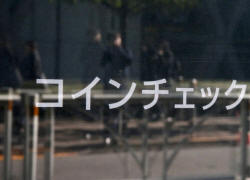Japan raps Coincheck, orders broader checks after $530
million cryptocurrency theft
 Send a link to a friend
Send a link to a friend
 [January 29, 2018]
By Taiga Uranaka and Thomas Wilson [January 29, 2018]
By Taiga Uranaka and Thomas Wilson
TOKYO (Reuters) - Japan's financial
regulator said on Monday it would inspect all cryptocurrency exchanges
and ordered Coincheck to get its act together after hackers stole $530
million worth of digital money from its exchange in one of the biggest
cyber heists on record.
The theft highlights the vulnerabilities in trading an asset that global
policymakers are struggling to regulate and the broader risks for Japan
as it aims to leverage the fintech industry to stimulate economic
growth.
The Financial Services Agency (FSA) on Monday ordered improvements to
operations at Tokyo-based Coincheck, which on Friday suspended trading
in all cryptocurrencies except bitcoin after hackers stole 58 billion
yen ($534 million) of NEM coins, among the most popular digital
currencies in the world.
Coincheck said on Sunday it would return about 90 percent with internal
funds, though it has yet to figure out how or when.

The NEM coins were stored in a "hot wallet" instead of the more secure
"cold wallet", which operates on platforms not directly connected to the
internet, Coincheck said. It also does not use an extra layer of
security known as a multi-signature system.
The hack has drawn into focus Japan's approach to regulating
cryptocurrency exchanges. Last year, it became the first country to
regulate exchanges at the national level - a move that won praise for
boosting innovation and protecting consumers, and that contrasts sharply
with crackdowns in South Korea and China.
The FSA said it ordered Coincheck to submit a report on the hack and
measures for preventing a recurrence by Feb. 13, and that it will, if
necessary, conduct on-site inspections of other cryptocurrency
exchanges.
The regulator also said it has yet to confirm whether Coincheck had
sufficient funds for the reimbursement.
But the regulator does not have any rules banning the use of "hot
wallets" by exchanges, nor does it set requirements on how much should
be kept in "cold wallets," an FSA official said at a briefing.

In response to FSA's order for improvements, Coincheck said in a
statement that it would promptly strengthen its customer protection and
governance, and develop its risk management systems.
Japan started to require cryptocurrency exchange operators to register
with the government only in April 2017, allowing pre-existing operators
such as Coincheck to continue offering services ahead of formal
registration.
The FSA has registered 16 cryptocurrency exchanges so far, and another
16 are still awaiting clearance. Coincheck's application was made in
September.
"It's been long said that cryptocurrencies are a solid system but
cryptocurrency exchanges are not," said Makoto Sakuma, research fellow
at NLI Research Institute.
[to top of second column] |

Cryptocurrency exchange Coincheck's signboard is pictured in front
of a building where their office is located, in Tokyo, Japan January
29, 2018. REUTERS/Kim Kyung-Hoon

"This incident showed that the problem has not been solved at all. If Coincheck
screws up its crisis management, that could deal a blow to the current
cryptocurrency fever."
NEM fell to $0.78 from $1.01 on Friday but recovered to $0.95 late on Monday
afternoon, according to CoinMarketCap. Crypto-currency related shares mostly
rose in Tokyo, with GMO Internet, which offers cryptocurrency exchange services,
gaining 5.7 pct.
Exchange operators in Tokyo said the Coincheck hack will likely cause concerns
over security to grow among consumers, potentially pressuring the price of
cryptocurrencies.
"I have to admit that all cryptocurrencies will now be tainted in their minds,
so there may be a mid-term negative impact," said Genki Oda, president of
BitPoint Japan.
CRYPTOCURRENCY RISKS
Singapore-based NEM Foundation said it had a tracing system on the NEM
blockchain and that it had "a full account" of all of Coincheck's lost NEM
coins. It added that the hacker had not moved any of the funds to any exchange
or personal accounts but that it had no way to return the stolen funds to its
owners.
In 2014, Tokyo-based Mt. Gox, which once handled 80 percent of the world's
bitcoin trades, filed for bankruptcy after losing around half a billion dollars
worth of bitcoins. More recently, South Korean cryptocurrency exchange Youbit
last month shut down and filed for bankruptcy after being hacked twice last
year.

World leaders meeting in Davos last week issued fresh warnings about the dangers
of cryptocurrencies, with U.S. Treasury Secretary Steven Mnuchin relating
Washington's concern about the money being used for illicit activity.
Japan's top financial diplomat said regulation of cryptocurrencies would likely
be on the agenda at the G20 finance chiefs' meeting in Argentina in March.
South Korea will this week ban cryptocurrency traders from using anonymous bank
accounts to crack down on the criminal use of virtual coins. China, worried
about financial risks from such trading, has ordered some exchanges in Beijing
to close.
(Additional reporting by Makiko Yamazaki, Takahiko Wada, Hideyuki Sano,
Chang-Ran Kim and Tetsushi Kajimoto in TOKYO, Vidya Ranganathan in SINGAPORE;
Writing by Chang-Ran Kim; Editing by Shri Navaratnam and Sam Holmes)
[© 2018 Thomson Reuters. All rights
reserved.] Copyright 2018 Reuters. All rights reserved. This material may not be published,
broadcast, rewritten or redistributed.
Thompson Reuters is solely responsible for this content.
 |